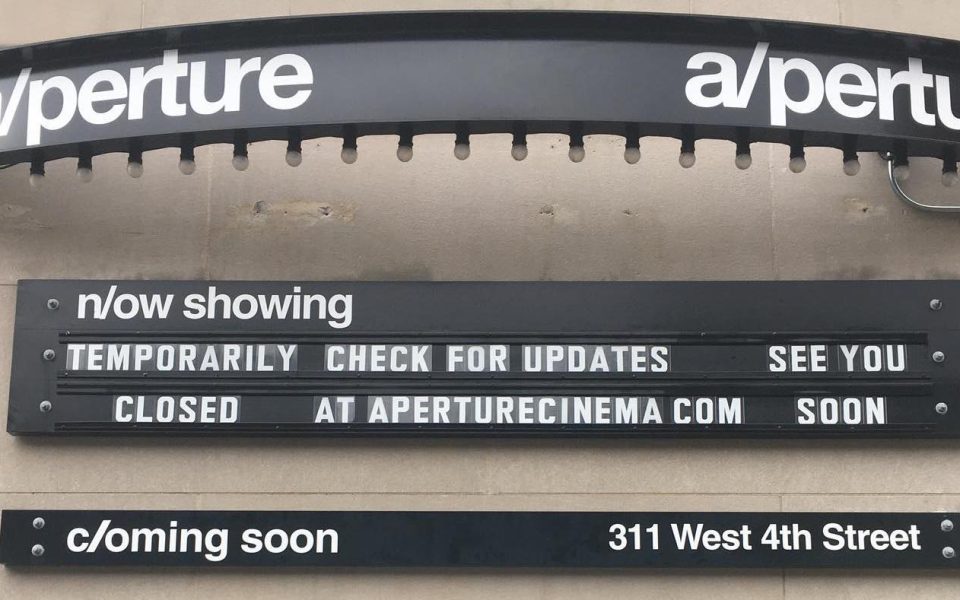A world with no movie theaters seems unimaginable.
“No one wants to see the death of movie theaters,” says Lawren Desai, curator and owner of A/perture Cinema in Winston-Salem. “They’re so meshed in our society.”
On Mar. 10, Gov. Roy Cooper declared a state of emergency in response to the coronavirus and the state entered Phase I, requiring individuals to stay home except for work or essential travel and closed most businesses including movie theaters. In the months that followed, some businesses were allowed to reopen from restaurants to salons to bars and on Oct. 2, the state entered Phase 3, allowing movie theaters and other entertainment venues to reopen with occupancy limits and other restrictions.
However, nationwide theater franchise Regal Cinemas recently re-closed all of their locations on Oct. 8 in response to “an increasingly challenging theatrical landscape and sustained key market closures.”
The coronavirus pandemic has led to a decline in box-office ticket sales, causing movie theaters to change the way they show films or close completely. On Jan. 24, a few months before the pandemic, the film The Gentlemen was released. According to Box Office Mojo, a website for tracking box office revenue, the film was a commercial success, grossing more than $36 million domestically; however, on Mar. 24, just after businesses were hit with closures, the film grossed a mere $4.
In June, a bipartisan proposal for small business loans was introduced in the US House of Representatives. The RESTART Act would build upon the Payment Protection Program and would allow organizations to be eligible for up to $12 million or 45 percent of their 2019 earnings.
“The RESTART Act provides a solution to the desperate need for capital faced by cinemas, theaters, live music venues and performing artists,” wrote NATO, the National Association of Theatre Owners in a statement in July. The bill was referred to committee and hasn’t received a vote in the upper chamber.
For now, rather than opening up to the public, A/perture is making do by offering private theater rentals for groups of a dozen or less, according to Desai. They chose not to reopen to the public after gauging the complex guidelines of reopening and the employees’ comfort level with reopening.
“Obviously the safety is the number one priority and we early on set standards we felt comfortable with,” Desai says.
They also considered the availability of films and sent a survey to audiences to learn their willingness to return.
Those interested in private rentals can bring their own film or rent one from A/perture’s virtual cinema. Changes within A/pertures include a new filtration system, plexiglass windows at the concession counter and touch-free sanitizer stations throughout the building. The website has been updated with a theater reservation form. The theater is also taking extra precautions to sanitize between private screenings.
“We bought a Ghostbuster type-looking fogging machine that will disinfect and sanitize the seats,” Desai says.
Because film production has been halted for the past seven months causing a lack of new movies available, Desai tries to choose a variety of films for the virtual cinema to keep it interesting. One of her favorite films showing right now is Aggie, a documentary about art collector Agnes Gund.
“Rather than the idea of people collecting art and sticking it in their house and no one ever being able to see it,” Desai says, “she kind of buys art and gives it to museums and is really about sort of making it available to everybody.”
Other event centers in the area began adopting the drive-in movie model to stay in business.
Brandon Monroe headed to Greensboro Coliseum for the Black Joy Drive-In, a nationwide tour of classic Black film screenings by Color of Change Political Action Committee.
Although he enjoyed the vintage feel of the drive-in movie setting, it was just one of few opportunities to view a film outside of the home due to coronavirus.
“COVID changed my movie theater experience by making me have to be more creative on how I make movie night at home,” Monroe says. “Thankfully I have Netflix, Disney+, Amazon Prime movies, and Hulu so in a way it’s not a bad experience.”
In addition to private screenings, A/perture is hosting outdoor Halloween movie screenings at SECCA as part of Screen Oddities, an ongoing partnership between A/perture and SECCA highlighting cult horror films. The Ramkat is also a co-host.
Both Desai and Monroe remain hopeful that theaters will fully reopen, but with coronavirus cases remaining, they are unsure.
“I think theaters will eventually open back up, however they have a lot of revamping to do and planning in regards to sanitation and proper seating arrangements,” Monroe says. “It can work but they will have to definitely plan and execute.”
Desai believes that movie theaters are not just an important part of our society’s culture, but an entertainment adventure designed to be shared with others rather than solo movie nights at home.
“When you laugh together or cry together it’s a totally different experience,” she says.
To schedule a theater reservation or to purchase tickets to outdoor screenings, visit A/perture’s website.
Join the First Amendment Society, a membership that goes directly to funding TCB‘s newsroom.
We believe that reporting can save the world.
The TCB First Amendment Society recognizes the vital role of a free, unfettered press with a bundling of local experiences designed to build community, and unique engagements with our newsroom that will help you understand, and shape, local journalism’s critical role in uplifting the people in our cities.
All revenue goes directly into the newsroom as reporters’ salaries and freelance commissions.


Leave a Reply